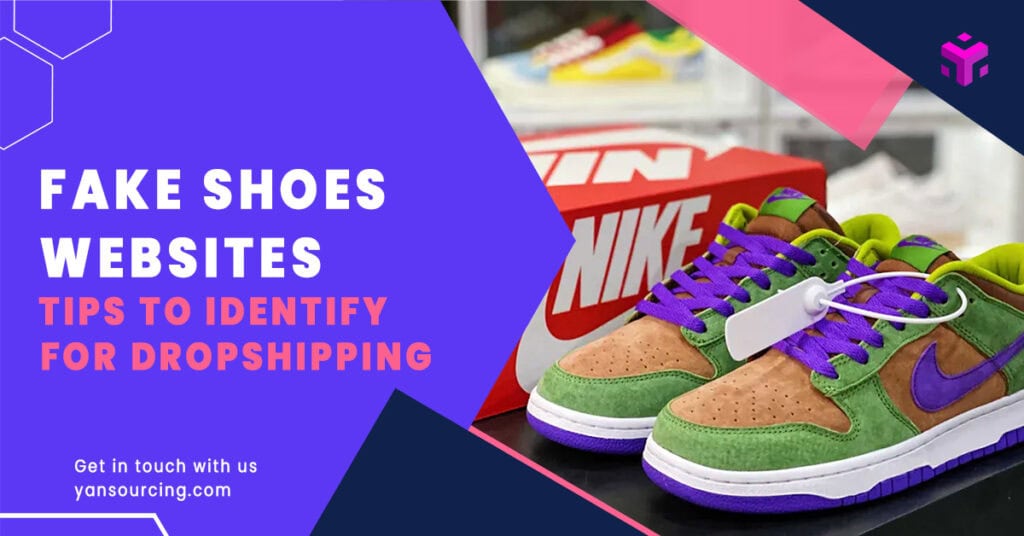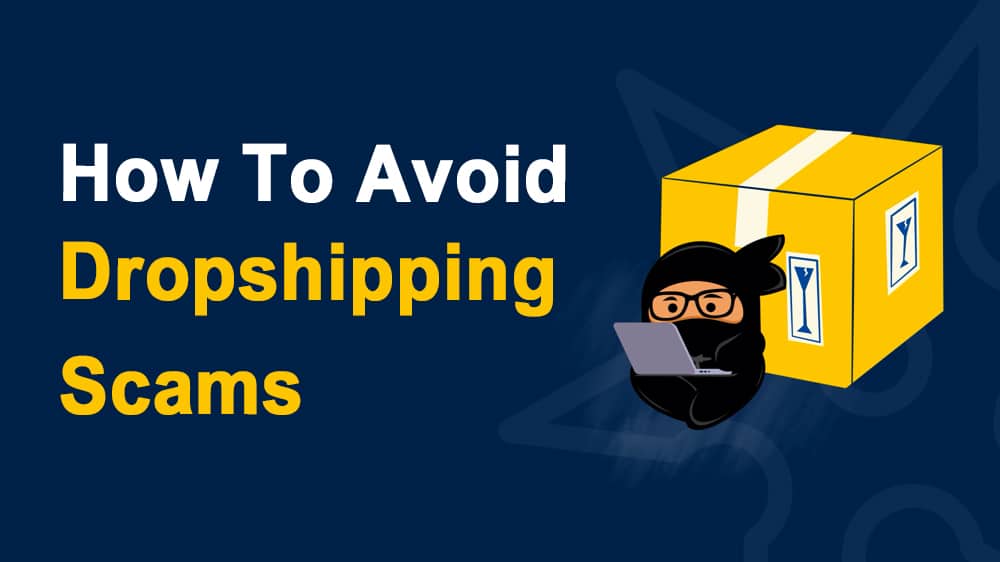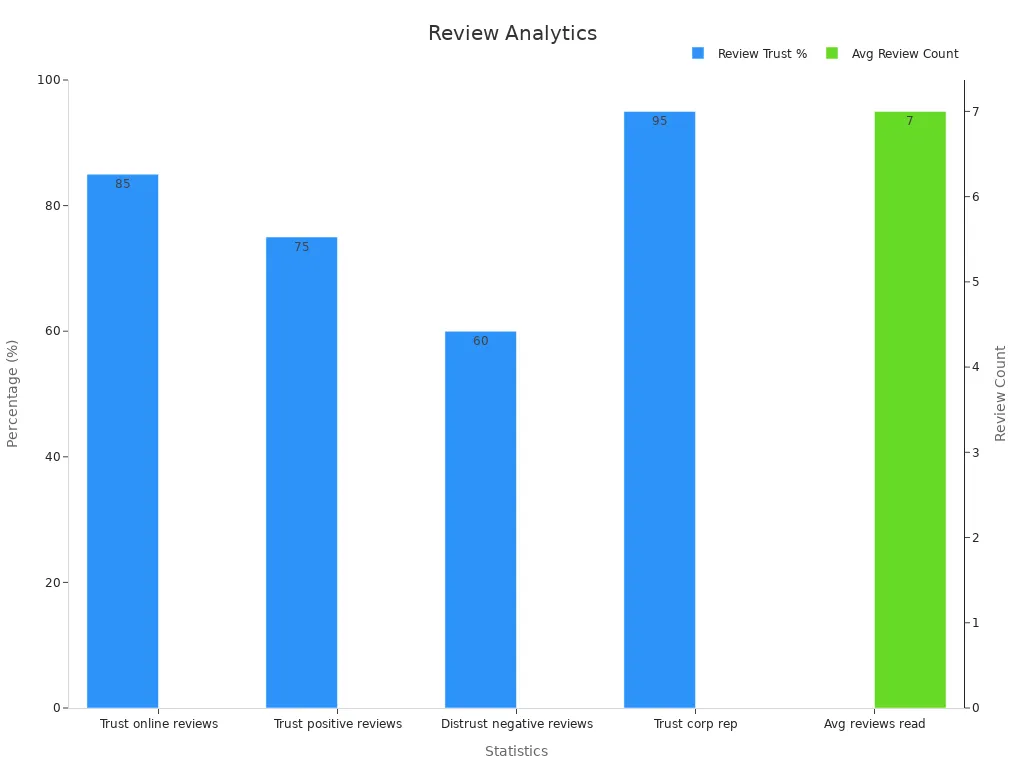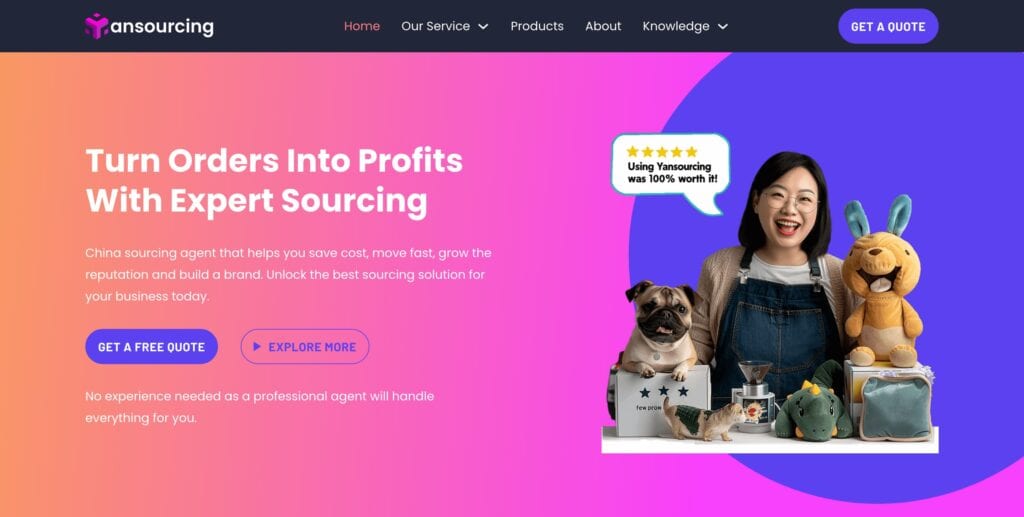
Running a dropshipping business is more than just picking products. You must verify that your suppliers are honest and reliable. Fake shoes websites can severely harm your business. They might display fraudulent ads or send counterfeit shoes to customers. This can upset buyers and damage your reputation. Even worse, you might face legal trouble for selling fake items.
To keep your dropshipping operation safe, you need to remain vigilant. Learning to spot scams, including fake shoes websites, is crucial. Yansourcing can assist with this. They have extensive experience in finding reputable suppliers. They ensure your products are of high quality, allowing you to worry less and grow your business more effectively.
Key Takeaways
Use tools like Semrush or Ahrefs to check if a dropshipping website is trustworthy. High scores mean it’s reliable.
Read reviews closely to find fake ones. Genuine reviews usually have specific details.
Look at product pictures and descriptions to see if they are real. Use reverse image search to check for stolen photos.
Make sure the website has SSL certificates for safety. Look for ‘https://’ in the web address to keep your payment safe.
Be careful of prices that are super cheap or discounts that seem unreal. Check normal prices to avoid getting tricked.
Understanding Fake Shoes Websites
What are fake shoes websites?
Fake shoes websites are online stores that sell fake or imaginary products. They often copy real stores by stealing logos, pictures, and designs. These sites trick people into buying fake shoes or stealing their payment details.
Here’s how big this problem is, based on recent research:
Metric | Value |
|---|---|
Fake Sneakers Stopped | |
Rejected Products Total | 400,000 |
Value of Rejected Products | $85 million |
These numbers show how dangerous fake shoes websites are for dropshipping. If you buy from them, you might sell fake shoes. This can hurt your reputation and make customers lose trust in you.
How fake websites target dropshipping businesses
Fake websites use tricks to fool dropshipping businesses. They know you want cheap suppliers and fast profits. So, they create scams that seem helpful but are not. Here are some common scams they use:
Fake courses that promise quick success but give bad advice.
Automation services that sell useless or low-quality products.
Supplier scams that charge fees and then disappear.
Viral product scams that sell fake trending items or never deliver.
Fake reviews to make bad products look good.
Stolen ads and fake store copies to steal your money.
These scams waste your time and money. Knowing these tricks can help you avoid them.
Risks of counterfeit products in dropshipping
Selling fake products can ruin your dropshipping business. First, it hurts your reputation. Customers expect real, good-quality items. Fake shoes make them angry, and they leave bad reviews. Second, selling fake items can get you into legal trouble. Big brands sue sellers of fake goods, even if you didn’t know. Lastly, it costs you money. Refunds, chargebacks, and lost customers can make you lose profits fast.
To protect your business, stay away from fake shoes websites. Work with trusted suppliers to sell real products and keep your customers happy.
Actionable Tips to Avoid Dropshipping Scams

Avoiding scams is key to keeping your business safe. It also helps you keep your customers’ trust. Follow these simple steps to work with real suppliers and sell genuine products.
Check if the website is real using domain tools
Start by checking if a dropshipping site is real. Scammers often use cheap or new websites to trick people. Use tools like Semrush, Ahrefs, or Moz to check if a site is trustworthy. These tools give scores to show how reliable a website is.
Metric | What It Means |
|---|---|
A score from 0-100 showing how strong a site’s links are. | |
Ahrefs Domain Rating (DR) | A score from 0-100 showing how good the site’s backlinks are. |
Moz Domain Authority (DA) | A score based on the number of links and domains connected to the site. |
Look for high scores when using these tools. Low scores might mean the site is a scam. Also, check how old the website is. Scammers often use new sites, so be careful with websites that are only a few months old. Use online databases like QiChaCha to double-check if the domain is real.
Look at reviews and ratings from others
Reviews and ratings can help you avoid scams. They show if a supplier is reliable and sells good products. But not all reviews are real. Scammers sometimes post fake reviews to make their site look good.
Here are some facts about reviews:
Fact | Percentage |
|---|---|
People trusting online reviews like personal advice | 85% |
People trusting businesses with good reviews | 75% |
People avoiding businesses with bad reviews | 60% |
People trusting companies with a good reputation | 95% |
Average number of reviews read before trusting a business | 7 |

When reading reviews, look for patterns. If there are suddenly many good reviews after bad ones, they might be fake. Avoid suppliers with very general reviews. Real reviews usually mention specific details about the product or service.
Check product pictures and descriptions for fakes
Fake products are a big problem in dropshipping. Scammers often use stolen or fake pictures to trick buyers. Look closely at the product pictures and descriptions on the supplier’s website.
AI tools can help find fake products. These tools compare images to trusted databases. They can spot small differences in color, texture, or logos that might mean the product is fake. For example, fake shoes might have stitching or logos that look slightly off.
Read the product descriptions carefully. Real suppliers give detailed information about materials, size, and features. If the description is vague or copied, it could be a warning sign.
Tip: Always ask for product samples before choosing a supplier. This helps you check the product’s quality and make sure it’s real.
By following these steps, you can avoid scams and keep your business successful and trusted.
Look for safe payment options and SSL certificates
When picking suppliers for your dropshipping business, safety matters. Scammers often target websites without good security. This puts your money and private details at risk. Using secure payment methods and SSL certificates can keep you and your customers safe.
Why SSL Certificates Are Important
SSL certificates act like digital guards for websites. They protect sensitive data, like payment info, from hackers. You can tell if a site has SSL by checking for a padlock icon or “https://” in the web address. These signs mean the site cares about security.
Here’s why SSL certificates are key:
They keep your payment details safe from hackers.
They make customers feel secure when shopping.
They help businesses follow rules like PCI DSS to avoid legal issues.
If a supplier’s site doesn’t have SSL, it’s a warning sign. Don’t share payment info on unsafe websites.
Picking Safe Payment Methods
Safe payment methods give extra protection. They make sure your payments are secure and lower fraud risks. Here are some trusted options:
PayPal: Protects buyers and offers refunds for fraud.
Credit Cards: Many credit cards include fraud protection.
Escrow Services: Hold payments until you get your order.
Stay away from suppliers who only take risky payments like wire transfers or cryptocurrency. These are harder to recover if problems happen.
How to Check Website Security
Before paying, check if the supplier’s site is secure. Look for these things:
SSL Certificate: A padlock icon or “https://” in the URL.
Payment Gateway: Trusted ones like PayPal or Stripe.
Clear Policies: Refund and privacy policies that protect buyers.
If the site has broken links or old security, avoid it. A good supplier will care about your safety.
Tip: Test the payment process with a small amount first. This helps you check the supplier’s trustworthiness without losing much money.
By using safe payment methods and SSL certificates, you can avoid scams. Choosing secure suppliers helps protect your business and builds customer trust.
Red Flags of Fake Shoes Websites

Spotting fake suppliers is key to keeping your business safe. Fake shoes websites often show warning signs you can notice. Let’s explore three big red flags to help you avoid scams.
Prices that are too low or huge discounts
If a price seems way too low, it’s likely a scam. Fake suppliers often attract buyers with super cheap prices or big discounts. These deals might hide bad products or no products at all.
For instance, a site selling branded shoes at 90% off is suspicious. They might sell fake items or nothing at all. Real suppliers don’t offer such big discounts because they have costs to cover. Here’s a simple guide to spot pricing issues:
Red Flag Type | Description |
|---|---|
Prices that seem too low often mean trouble. | |
High-Pressure Sales Tactics | Rushing you to buy might hide unclear pricing details. |
If prices seem strange, pause and research the product’s usual cost. If the deal is much lower, it’s a warning. Always choose quality over cheap prices to avoid fake items.
Missing contact details or unclear supplier info
Good suppliers share clear contact details. Fake ones often hide or leave out important information. If you can’t find an email, phone number, or address, it’s a bad sign.
Here’s why this matters:
40% of buyers return items due to unclear product info.
Missing details can make customers doubt the supplier.
Inaccurate info can stop people from completing purchases.
Check the supplier’s “About Us” and “Contact” pages. Look for an address, phone number, and email. If the info is unclear or missing, move on. Honest suppliers are easy to contact.
Tip: Test their response by sending a question. If they reply late or avoid answers, it’s a red flag.
Bad website design and broken links
A good website shows a supplier’s trustworthiness. Fake shoes websites often have messy designs, broken links, or missing features. These problems make the site look unreliable.
Broken links are a common issue. They lead to error pages and frustrate users. This also hurts the site’s search ranking. A poorly made site might mean the supplier doesn’t care—or it’s a scam.
When checking a supplier’s site, look for:
Links that don’t work or lead to errors.
Old designs that seem unprofessional.
Missing tools like search bars or filters.
If the site feels messy or incomplete, it’s a warning. A good supplier invests in a clean, easy-to-use website to gain trust.
Note: Trust your gut. If a website feels wrong, it’s better to be careful than to risk it.
By watching for these red flags, you can avoid scams. Being careful now can save you from bigger problems later.
Too Many Stock Images or Copied Photos
Fake shoes websites often use pictures that aren’t real. They rely on stock images or stolen photos to look trustworthy. But if you check closely, you can spot the truth.
Why Stock or Stolen Photos Are Bad
Stock images are basic pictures anyone can download or buy. They’re fine for ads but not for showing products. Real suppliers use their own photos of items from different angles. Fake websites use stock images because they don’t have the actual products.
Stolen photos are worse. Scammers copy pictures from real brands or sellers. These photos may look good but don’t show what you’ll actually get. This can upset customers and hurt your business.
Note: If product pictures look too perfect or match a big brand’s site, it’s suspicious.
How to Spot Fake Photos
You don’t need special skills to find fake pictures. Try these steps:
Reverse Image Search: Use Google Images or TinEye. Upload the photo to see if it’s on other sites. If it shows up on many unrelated sites, it’s likely stolen.
Look for Watermarks: Some scammers forget to remove watermarks from stolen pictures. If you see one, it’s a warning sign.
Check Style Consistency: Real suppliers have similar styles in all their photos. If the pictures look like they’re from different sources, the site might be fake.
Inspect Details: Zoom in on the images. Blurry logos, odd colors, or bad edits can mean the product is fake.
What Real Product Photos Look Like
Trustworthy suppliers take their own pictures. These usually include:
Close-ups showing material, stitching, and logos.
Views from different angles like front, back, and sides.
Lifestyle shots showing the product being used.
Unique settings that don’t look overly polished.
If a website doesn’t have these types of photos, it might not be reliable.
Why This Matters for Your Business
Using fake or stolen photos can hurt your dropshipping store:
Angry Customers: Buyers expect items to match the pictures. If they don’t, customers will leave bad reviews or ask for refunds.
Legal Trouble: Selling fake products with stolen photos can lead to lawsuits from real brands.
Lost Trust: Once customers stop trusting your store, it’s hard to fix your reputation.
Tip: Always ask for samples and original photos from suppliers. This helps you know exactly what you’re selling.
By spotting stock or stolen photos, you can protect your business. Honest suppliers always use real pictures that show their products clearly. Stay alert to avoid problems.
Tools and Resources to Verify Suppliers

Checking suppliers is key to a successful dropshipping business. It helps you avoid scams, ensures good products, and earns customer trust. Here are some tools and resources to make this easier.
Trade registers and supplier directories
Trade registers and directories are helpful for checking suppliers. These platforms give detailed info about manufacturers and their products. They help confirm if a supplier is real and dependable.
Here’s what these tools offer:
Feature | Description |
|---|---|
Lists supplier names and product details in one format. | |
Product Specifications | Shows images, videos, and PDFs for better understanding. |
Risk Reduction | Limits who can sell, lowering risks in the supply chain. |
Product Management | Lets you approve or block products and sellers. |
Some directories include ISO-certified companies that meet global standards. Tools like Moody’s Entity Verification API give real-time data from over 200 countries. This helps you quickly check supplier details.
Certifications and business licenses
Certifications and licenses show if a supplier is trustworthy. Certified suppliers follow strict rules for quality and safety. This can give you confidence in their products.
Studies show certified companies often perform better in customer service and improvement. While not all certified suppliers are perfect, these credentials lower risks. Always ask for proof of certifications and licenses before working with a supplier.
Online databases like Lazada’s supplier verification tools
Online databases, like Lazada’s tools, give useful details about suppliers. They show product catalogs, seller ratings, and customer feedback. This helps you pick the best suppliers for your store.
Here’s what you can find on these platforms:
Product details, including pictures and descriptions.
Seller ratings, like delivery speed and customer reviews.
Market trends to help you stay ahead of competitors.
Using these tools helps you make smart choices and avoid bad suppliers.
Tip: Use several tools together for the best results. This gives you a full view of a supplier’s reliability.
Forums and social media for supplier reviews
Forums and social media can help you check suppliers. These platforms have real people sharing their experiences. You can learn about good and bad suppliers. If you’re not using them, you’re missing helpful information.
Why Forums and Social Media Are Useful
Websites like Reddit or dropshipping forums are great for honest opinions. People share if a supplier is good or has problems like late shipping or bad products. Social media sites like Facebook and Instagram also help. Customers leave comments on supplier pages, showing how they treat buyers.
Tip: Look for recent posts. If a forum or page is inactive, it may not be helpful.
How to Use Them Well
Here’s how to get the most from these platforms:
Search Supplier Names: Use terms like “[Supplier Name] reviews” or “[Supplier Name] scam.”
Join Groups: Facebook and LinkedIn have groups where people share advice.
Ask Questions: Post your own questions. Many members will answer.
Read Comments: Check what customers say and how suppliers reply to complaints.
Things to Be Careful About
Not all reviews online are true. Some might be fake, either too positive or too negative. Look for repeated issues. If many people mention the same problem, it’s likely real.
Note: Avoid suppliers who delete bad comments or block users. Honest suppliers are open about feedback.
Using forums and social media can help you find reliable suppliers. It’s an easy way to avoid problems and make better choices.
How Yansourcing Helps Avoid Counterfeit Products

Running a dropshipping business can be stressful. Avoiding fake products is hard, but Yansourcing makes it easier. They help you find reliable suppliers and deliver good-quality items. Let’s see how Yansourcing protects your business from scams.
Checking suppliers carefully
Yansourcing checks suppliers to make sure they are trustworthy. They look at certifications, rules, and reliability. This helps stop fake products from entering your store.
Here’s why these checks matter:
They watch how suppliers perform to see if they’re reliable.
Certifications show suppliers follow strict rules.
Regular checks keep product quality high.
Key Point | Why It Matters |
|---|---|
Builds trust and handles problems better. | |
Watching supplier performance | Makes sure suppliers meet your needs. |
Supplier checks and certifications | Stops fake products and follows industry rules. |
With Yansourcing, you save time and keep your reputation safe by working with verified suppliers.
Finding the best suppliers
Good suppliers are important for dropshipping success. Yansourcing finds suppliers that match your needs. They focus on quality, trust, and fair prices.
Here’s what Yansourcing does:
Sets clear rules for supplier quality.
Uses checks to spot fake parts early.
Reviews suppliers often to keep standards high.
This helps you get real products your customers will like. It also keeps your business safe from scams and running smoothly.
Quality checks to stop fake products
Yansourcing makes sure your products are real. Their inspections catch fake items before they reach your customers. They check materials, designs, and codes to confirm authenticity.
Benefits of these checks include:
Spotting fake parts with detailed inspections.
Testing materials to ensure they last.
Scanning codes to confirm products are from real makers.
These steps protect your business and make customers trust you more. Yansourcing handles quality checks so you can focus on growing your store.
Tip: Always check product quality to keep your customers happy and your brand strong.
Using Yansourcing’s help, you can avoid fake products, earn customer trust, and grow your dropshipping business confidently.
Tailored solutions for sourcing clothes and shoes
Finding good suppliers for clothes and shoes can be tough. You need products that match what your customers want and stay high quality. That’s why tailored solutions are helpful. They make sourcing easier and connect you with reliable suppliers who deliver on time.
Yansourcing provides custom sourcing services for dropshipping businesses like yours. These services focus on finding trustworthy suppliers, choosing the right products, and helping with negotiations. Let’s see how these tailored solutions can simplify your sourcing process.
Why Tailored Solutions Are Important
Tailored solutions help you get exactly what you’re looking for. You can choose details like fabric type, shoe sizes, or even designs. This customization helps you find suppliers that fit your business needs. It also saves time by avoiding unreliable options.
Here’s a quick overview of key metrics for successful sourcing:
Metric | What It Means |
|---|---|
Supplier Reliability | Ensures suppliers deliver good products on time, which is vital for dropshipping. |
Product Selection | Lets you pick product details like fabric and sizes to find the best suppliers. |
Comparative Analysis | Makes it easy to compare prices, quality, and shipping times for better deals. |
Negotiation Support | Offers tools and tips to negotiate better deals with suppliers. |
These metrics show how tailored solutions can help you find better products while keeping quality high.
How Yansourcing Helps You
Yansourcing makes sourcing simple with personalized services. They check suppliers, compare options, and handle negotiations for you. This way, you get great products without the stress. They also give detailed reports to help you make smart choices.
Tip: Always request samples before choosing a supplier. This helps you check the product’s quality yourself.
With tailored solutions, you can focus on growing your business while Yansourcing takes care of sourcing clothes and shoes.
What’s Next?
Start by figuring out what products you need. Share your requirements with Yansourcing, and they’ll find the best suppliers for you. Their tailored solutions save you time and ensure your customers get high-quality products.
Conclusion
Finding fake shoes websites is important to protect your business. Selling fake items can ruin your reputation and cost you money. It might also get you into legal trouble. Check suppliers carefully and verify their licenses to avoid these problems. This helps you build a trustworthy business.
Yansourcing makes this easier. They find good suppliers and check product quality. They make sure your items meet high standards. For example, Yeezy sneakers priced under $1,000 or over $3,250 are often fake. This shows why checking prices is important, and Yansourcing can help with that.
Start now. Use the tips in this guide and work with Yansourcing. This will keep your business safe and ensure your customers get real products.
FAQ
1. How can you spot a dropshipping site that might be fake?
Look for warning signs like super cheap prices or missing contact info. Check if the website design looks bad or outdated. Use safe payment methods and confirm the company has proper licenses. Read reviews to make sure the supplier is trustworthy.
2. What are common dropshipping scams to avoid?
Scammers may sell fake products or pretend to be suppliers. They often use stolen pictures or fake reviews to trick people. Always check the supplier’s background and look out for fake reviews before deciding to work with them.
3. Why is checking product quality important in dropshipping?
Good quality products keep customers happy and protect your reputation. Selling fake or bad items can lead to refunds, bad reviews, or legal trouble. Working with trusted suppliers helps you avoid these problems.
4. How do safe payment methods help your business?
Secure payment options like PayPal or escrow services protect your money. They offer refunds if something goes wrong and lower the risk of fraud. Avoid unsafe methods like wire transfers when dealing with new suppliers.
5. Can fake shoes websites hurt your business?
Yes, selling fake shoes can make customers lose trust in you. People expect real, high-quality products. If you sell bad items, they might leave bad reviews or ask for refunds. This can harm your reputation and your business.

